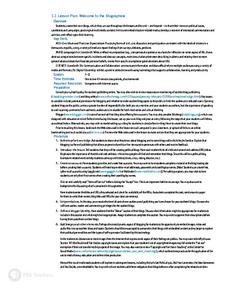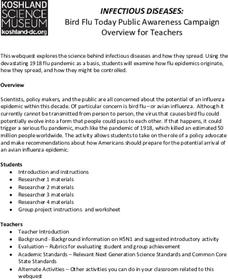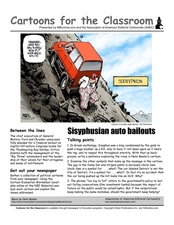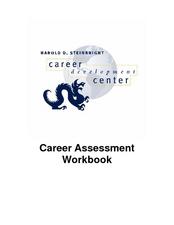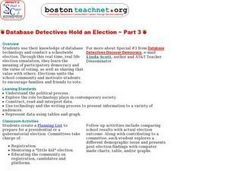Curated OER
Simple Thermodynamics of Transportation
Students watch videos about various modes of transportation, they examine the energy transformations that occur in each, and they be introduced to the laws of thermodynamics.
Curated OER
Mammals: Mammals and Their Ways
Students study the difference between innate and learned behaviors. They observe the adaptations and behaviors of mammals in this series of lessons.
Curated OER
The Great MPA Debate
Students study the 'Marine Protected Areas' process. In this ocean lesson students work in groups, conduct research and present it to the class.
Curated OER
Welcome to the Blogosphere
Create a blog spot for your classroom and promote online discussions. There are several blogging websites listed here, and you can create one specific to each class or one collective site. Teach your learners how to post on the blog, and...
ProCon
School Uniforms
Americans spend around one billion dollars each year on school uniforms, but are they necessary? As pupils research the debate topic, they form their own opinions. They review the history of school uniforms and discover the top pro and...
National Academy of Sciences
Infectious Diseases: Bird Flu Today
Understanding how viruses spread has never been more important. A well-designed WebQuest lesson has young scientists research viruses, how they spread, and how they are treated. They also consider the trends in common viruses in the world.
cordovla.weebly.com
Summarizing, Paraphrasing and Quoting
How skilled are your class members at summarizing, paraphrasing, and quoting from a text? Find out with this assessment that asks readers to identify the thesis statement, the summary, the paraphrases, and the quoted material in an...
Curated OER
Government Protecting Rights
High schoolers explore tribal sovereignty. In this American Indian lesson, students learn about tribal sovereignty, watch a movie, take notes, and complete a reaction paper.
Stanford University
Beyond Vietnam
On April 4, 1967 Martin Luther King, Jr. delivered his speech "Beyond Vietnam." The controversy that followed is the focus of a three-instructional activity unit that asks class members to consider the political and social implications...
Curated OER
"Big Three" Bailouts
What does your class think about big business bailouts by the U.S. Government? Find out with this activity, where learners analyze a political cartoon comparing the "Big Three" automakers with the Greek Myth of Sisyphus. Background...
Curated OER
Career Assessment Workbook
Planning a career assessment unit? Download this workbook and you are all set. Job seekers identify work-related values, set goals, and plan the steps necessary to achieve those goals. It is also important to consider obstacles that they...
Curated OER
Fabric Scrap Flower Garden
Crafting is fun, it increases eye-hand coordination, and it is a great way to accent any lesson. Celebrate Earth Day by creating scrap fabric flowers for a pop-stick flower garden. Children of all ages will love gluing, cutting, and...
Curated OER
Investigative Case - "Swampeast Missouri"
Students explore wetland hydrology and biology and decide whether or not to restore a wetland or retain dams and drainage systems. They examine the complexity of decisions regarding wetland restoration as well as investigate viewpoints...
Curated OER
The Indian Subcontinent Since 1947: The Legacy of Independence
An exploration of Indian and Pakistani cultures and conflicts throughout the 20th - 21st centuries, this presentation features relevant political cartoons and poignant photos to illustrate the breadth of politics in India and Pakistan....
Simon and Schuste
Gone with the Wind - Reading Group Guide
Love, war, race, class, religion, honor are just a few of the topics readers of Gone with the Wind are prompted to discuss by the questions included in this very thoughtful reading guide.
Teaching Tolerance
Film Festival
Everybody's a critic—even your pupils! Using the included resources as a guide, screen films related to social justice and ask film enthusiasts to critique them. Publish the reviews for your school community or develop a film festival...
Curated OER
Database Detectives Hold an Election ~ Part 3
Students use a database to conduct a schoolwide election. They discover the importance of voting and democracy. They incourage one another to vote.
Curated OER
Local Governments Don't Do Much ... Or Do They?
Young scholars study and explore their local government. They role play members of their City Council and various constituents as they discuss a variety of subjects typical of a city council meeting.
Curated OER
Schools for Sale
Learners explore the concept of for-profit companies running schools. In this privatizing schools activity, students simulate a meeting of school board members, community leaders, and other stakeholders to determine the privatization of...
Curated OER
Campus Greenhouse Gas Emissions Inventory
Students brainstorm the campus links to global warming. Students pick topics for individual or group research. Students develop a research plan. Students keep good records and report their progress. Students report findings both...
Curated OER
The New Segregation
Students use census data to analyze the racial and economic diversity of their community. They discuss the role of diversity within communities and the impact that land use decisions can have on the composition of a community.
Curated OER
A Feast for the Future
Students participate in an activity that uses a simulated meal of transgenic foods in order to initiate a discussion of the controversy concerning the use of transgenic food products.
Curated OER
How the Electoral College Works
Students research the history and mechanics of the Electoral College and formulate opinions as to whether this institution should be preserved, modified or eliminated. They predict future outcomes of electoral vs. popular votes.
Curated OER
Government: The Power of Persuasion
Students are able to define and identify a type of interest group. They are able to describe some strategies used by interest group. Students are able to identify the postive and negative aspects of interest groups.





